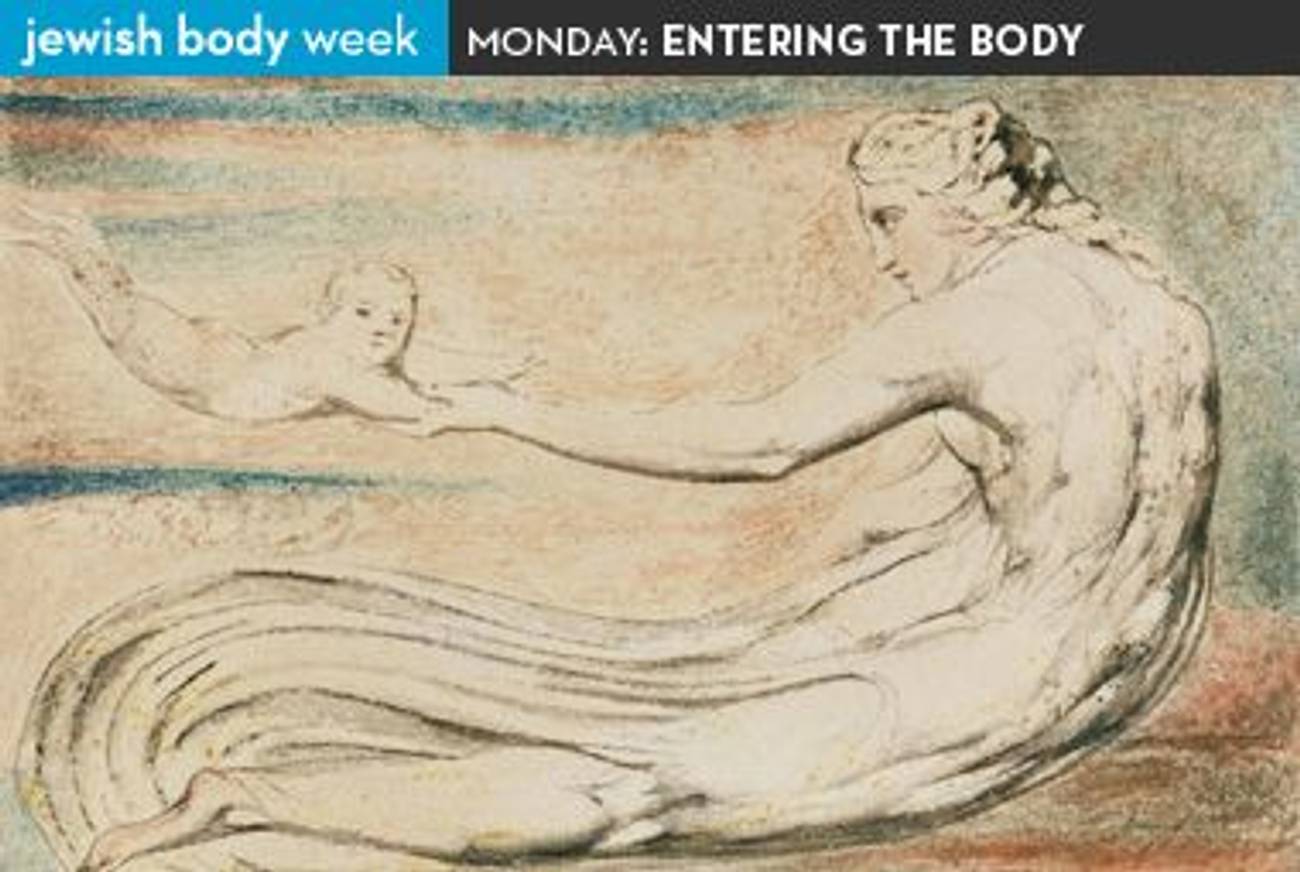Braiding Flesh and Spirit
Kicking off a weeklong examination of the Jewish body




The Rabbis tell a Midrash about the soul before birth, forced to inhabit the sperm brought by an angel before God on the day of conception. The soul, which has been basking in God’s glory, has no desire to enter what it calls an “impure sperm,” but God consolingly tells the soul that the world is actually better than the place the soul has been. Also, that it has no choice.
Under protest, the unpersuaded soul enters the sperm, is carried to the womb, and spends nine months happily studying the world and God’s ways. But then the time arrives for the soul to be born, which it has no desire to do, so an angel comes along, puts out the light of the womb, flicks the baby in the face, and ushers it crying into the world, divine knowledge erased. The Rabbis, masters of paradox—or at least great fathomers of paradoxical human nature—add a coda to this story, which is that on the day of death the same angel comes back to the soul, now happily adapted to its body, and tells the soul it’s time to go. And the person weeps and does not want to leave.
Jews are familiarly called “People of the Book,” but it is always worth remembering that the name was not their own—it was supplied by Islam. Jews are as much the people of the body as of the book, weeping when it is suggested, as it so often is, that it is time to go. Finding a way to fall in love with embodied existence in a way that allows the lure of heaven to grow dim. God tells the soul in the story above that the world, having been made specifically for human beings, is better than the divine holding-pen it inhabited before birth. And by the end of the Midrash, the soul is no longer doing the talking; a human being is a braid of body and spirit that Jews have seldom been much interested in unknitting.
Melvin Konner’s The Jewish Body, written for the Nextbook Press Jewish Encounters Series, grapples with the paradoxes of how a people with a disembodied God navigate the physical world, how they have viewed their own bodies, and how others have seen them. Though Konner, a medical doctor and an anthropologist, published his book a year ago, his anatomical history of the Jewish people provides a springboard for a great many discussions, from sexuality and circumcision to Jewish genetic differences.
Konner’s book has provided the inspiration for a week of public programs, and for a week of articles, essays, podcasts, videos, and discussions devoted to the Jewish body. Today inaugurates Nextbook Press’s Jewish Body Festival—see the calendar of events here—and also marks debut of Tablet Magazine’s weeklong Jewish body special section. For the next five days, Tablet will devote itself to the body, beginning today with birth. Tomorrow will focus on what might be called the feeding of the body—sex and food—the day after on transcending the body, through meditation, mysticism ,and prayer. That will be followed by a look at the body as it falters, through illness and age, and finally at death and resurrection.
To speak about the Jewish body is to speak about religion—questions of the soul live inside questions of the body. It is to speak about history—how things have changed in the way Jews have seen themselves—created in the image of God or in need, as a Jewish doctor concluded in the 19th century, of a nose job. Or perhaps both. It is also to speak about how Jews have been seen by others, a subject that leads inevitably to a discussion of anti-Semitism, since the “otherness” of the Jewish body has been a staple of modern racist notions of the Jewish people—not merely noses but hands and feet and hips. It is to speak about nationalism, for a land is like a body: it takes up space, exhibits aggression and appetites and stirs up deep excitement and discomfort. In short, it is to speak about everything.
Jonathan Rosen is the editor of the NextBook Press Jewish Encounters book series.